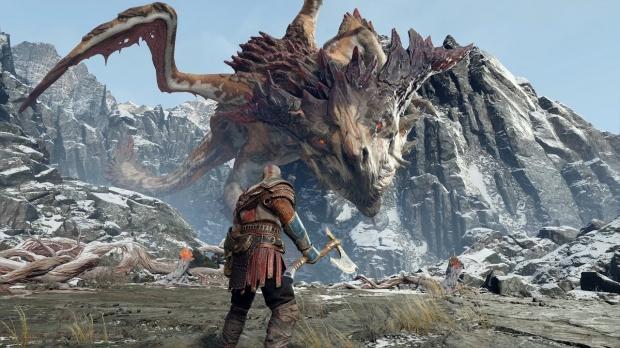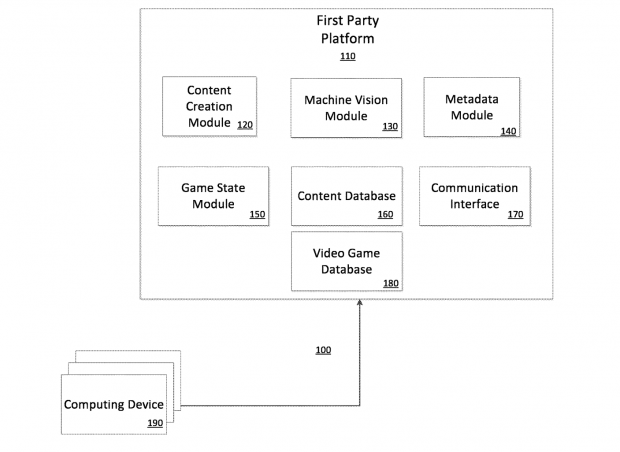Sony's new scene-tagging patent basically creates labels for shared screenshots and videos on the PlayStation Network. But this shared media isn't just for watching: You can actually play them.

While scanning Sony's new scene tagging patent, I noticed something pretty interesting: Videos aren't just static, but contain small slices of interactive gameplay that viewers can start up and play. The patent isn't just for sharing screenshots and videos, but actually sharing that particular gameplay slice too.
It's a direct extension of the immensely ambitious game demo patent that lets you create and share game demos on the PlayStation Network.
It could work like this: You record a 1-3 minute clip of, say, taking on a huge boss in a next-gen game. You upload it to the PS Network and your friends see it. Your friends can request to basically play that particular session of gameplay with your character/loadout. They wouldn't watch your video, but actually play it.
Here's how it's described:
"In particular, scene tagging is used to characterize user generated content associated with gameplay information associated with video games. Exemplary user generated content include video recordings or screenshots from within the video game that pertain to events that have occurred.
"..Furthermore, the metadata associated with the user-generated content will allow viewers to experience the same content that is recorded."
A patent diagram shows a "game state" being preserved for this purpose.

This is very similar to the interesting patent that would let users create their own small gameplay demos and upload them to PSN. The scene tagging patent should work in tandem with the demo patent and create lots of metadata like game title, time and date, username, and other custom user-created labels. This feature is also kind of like the save-state sharing feature Stadia outlined a bit ago.
Remember, as with all patents, this is just one example of what could happen. The patent is exhaustive with tons of embodiments that all outline different scenarios. There's the possibility that this won't translate into anything real and Sony hasn't announced anything concrete. This is just speculation.
But if genuine, the game-sharing feature will be absolutely huge for Sony's services. It would allow users to share the best parts of a game on a more open-ended network and dynamically advertise games in the best way possible: By actually playing them.
It'll be interesting to see if these new features are included with the PlayStation 5's rollout in 2020. Sony has been ramping up its services in preparation for the next-gen system and these features would be extremely potent.
But again, nothing's been announced so we can't treat this as fact (don't ever treat a patent as fact).
Sony is expected to reveal the PS5 in a special event in February 2020. The console will release in Holiday 2020, and it may cost $499.
Check below for more info:
PlayStation 5 specs and details:
- Custom SoC with second-gen Navi GPU, Zen 2 8-core, 16 thread CPU
- Navi, Zen SoC uses new AMD RDNA 2.0 architecture
- Ultra-fast SSD
- Support for 4K 120 Hz TVs
- Ray-tracing enabled
- 8K graphics support (probably video, not gaming)
- Plays all PS4 games
- Separate games that ship on BD-XL Blu-ray discs
- New controller with extensive haptic and tactile feedback
PlayStation 5 Coverage:
- PS5, Xbox Scarlett SSD may use Optane-like ReRAM to supercharge speeds
- NVIDIA G-Sync monitors to improve PlayStation 5 and Xbox Scarlett
- PlayStation 5: Everything We Know So Far
- PlayStation 5 confirmed to have 8C/16T Zen 2 CPU from AMD
- PS5, Project Scarlett may use Samsung's 6th gen V-NAND NVMe SSDs
- PS5 backward compatibility confirmed, will play PS4 games
- Sony's next-gen PlayStation 5 has 4K 120Hz output support
- PS5, Project Scarlett to hit over 10TFLOPs of power, sources say
- PS4 will be supported into 2022, to live alongside PS5
- Sony: ultra-high-speed SSD is 'the key' to next-gen PS5
- PS5 dev kit rumor: 'ultra-fast RAM', Navi GPU with 13 TFLOPs
- PlayStation 5 rumored to ship with 2TB of super-fast SSD for $499
- Insider: PlayStation 5 dev kit faster than Xbox Scarlett right now
- PS5 cartridges aren't real, patents are for Sony kids toys
- PS5's SSD may benefit PS4 games the most
- PS5 powered by Navi in 2020, AMD making Navi with Sony input
- Cloud-powered PlayStation controller may let you play free game demos
- Gran Turismo 7 is a PlayStation 5 launch title: launches Nov 20, 2020
- PS5 confirmed to support 8K video, ray tracing, all on Navi
- PlayStation 5 rumored to cost $499, launches November 20, 2020
- PlayStation game demos are coming back with Sony's ambitious new plan
- PS5 controller: Built-in mic, USB-C, no lightbar, ergonomic design
- PlayStation 5 concept video shows totally new design
- Sony solves PS5's biggest issue
- Sony: PS5 development going according to plan
- New Viking Assassin's Creed may be next-gen console launch game
- AMD working on 'secret sauce' for next-gen Xbox/PlayStation
- The first real photo of a PlayStation 5 dev kit appears
- Next-gen PS5/Xbox Scarlett open-world game: 'best real-time graphics'
- Sony restructures workforce to prepare for PS5
- PlayStation VR 2: built-in cameras, wireless, ready for PS5
- PS5 games will ship on 100GB Blu-ray BDXL discs
- PS5 and Xbox Scarlett will both handle ray tracing differently
- PlayStation 5 could feature AI-powered 'PlayStation Assist'
- Sony won't abandon singleplayer story-driven games on PS5
- PS5 rumor: GPU is nearly as powerful as RTX 2080, GPU clocked at 2GHz
- PlayStation 5 rumored to be unveiled on February 12, 2020
- Sony to raise PS5 cost thanks to U.S. tariffs

